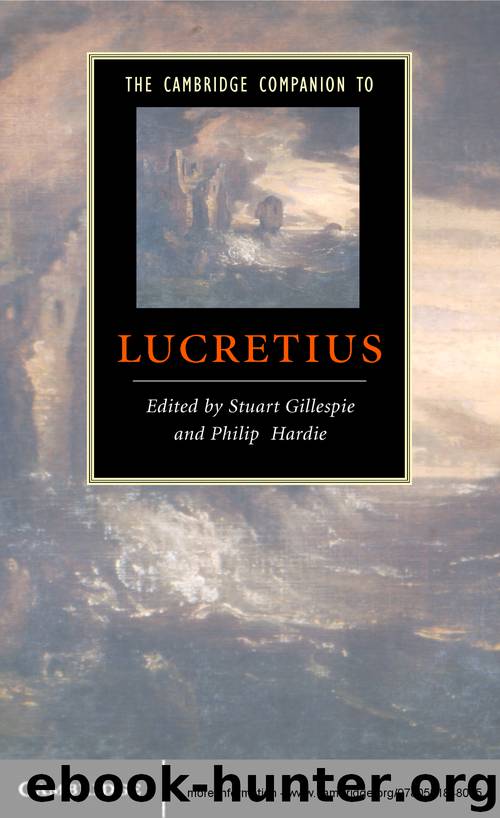The Cambridge Companion to Lucretius by Stuart Gillespie & Philip Hardie

Author:Stuart Gillespie & Philip Hardie [Gillespie]
Language: eng
Format: epub
Publisher: Cambridge University Press
Published: 2013-01-24T16:00:00+00:00
Burke had already (mis)quoted DRN 3.28–30 in Pt. II, sec. V of his Philosophical Enquiry (1759), and Kant was intimately familiar with Burke’s ‘empirical’ and often Lucretian-sounding view of the sublime’s psychological impact (CJ 29; Ak. 277; see also Ak. 7:261). But there are other attractions in store here for Kant. The moment described by Lucretius is one in which the materiality of phenomena finally ceases to be an obstacle and a limit to the materialist – their scrim is lifted off the visible world – and the materialist in effect transcends appearances to become something like a transcendental materialist, someone who can take a holy and eerie pleasure in the unlimited appearances of matter and the world. Such a pleasure, being grounded in a paradox as it is, can only be described as sublime. One might, by the same reasoning, say that for Kant an aesthetic subject in the face of the initial shock of the sublime (represented by brute matter and appearances), as opposed to the blissful and harmonious beautiful, is fundamentally an Epicurean.
The real question is, when is Kant not an Epicurean in his dealings with sensation? The question is genuine, because there is every reason to think that Kant’s theory of sensation is at its core a theory of the sublime, as well as a confrontation with Epicureanism in slightly cloaked guise. To see how this might be the case, one would have to look away from the classic instances of sublimity, familiar from the Third Critique, and turn instead to the First Critique (1781/7), in a chapter called the ‘Anticipations of Perception’ (B 208–25) where Epicurus is again explicitly invoked – this time as the eternal ‘anticipator’ of perception and sensation, so to speak (Kant’s term, Antizipation, is an explicit calque on Epicurean prolpsis, B 208) – and where Kant takes it upon himself to locate the ‘real’ of sensation. Here, it turns out that the real (or ‘matter’) of sensation can only be ‘anticipated’ a priori in an asymptotic approach but can never be known as such, and it thus poses the criterial limit between empirical and a priori knowledge; and that the very approach to this Real is sublime. This limit lies within every sensation, just as every perception contains an infinitely divisible synthesis of the manifold of appearances (one that, as in the mathematical sublime of the Third Critique, threatens to overwhelm the mind with its unsynthesisable contents). Consequently, every moment of sensation is inhabited or inhibited, from the perspective of critical philosophy, by the sublime, in the form of its anticipation.
This ‘transcendentalist’ urge within the sublime tradition helps to account for one of its odder features. It is sometimes doubted whether nature, in the last analysis, can be counted as sublime in Lucretius. Nature is finally made banal, trivialised, no longer a fearful or wondrous object, but merely an intelligible object. How can this deprecating gesture be squared with sublimity? The same question can be posed with regard to Kant. For
Download
This site does not store any files on its server. We only index and link to content provided by other sites. Please contact the content providers to delete copyright contents if any and email us, we'll remove relevant links or contents immediately.
Letters From a Stoic by Seneca(2792)
The Valmiki Ramayana: Vol. 1 by Bibek Debroy(2407)
The Valmiki Ramayana: Vol. 2 by Bibek Debroy(2267)
The Valmiki Ramayana: Vol. 3 by Bibek Debroy(2212)
Mary Boleyn by Alison Weir(1881)
The Greeks by H. D. F. Kitto(1743)
The Notebooks of Leonardo Da Vinci by Da Vinci Leonardo(1599)
The Classics by Mary Beard(1589)
Mythos (2019 Re-Issue) by Stephen Fry(1565)
The Voynich Manuscript by Gerry Kennedy(1471)
Medea and Other Plays by Euripides(1439)
Art of Living by Sellars John;(1424)
Annals by Tacitus(1406)
Hindoo Holiday by J. R. Ackerley(1376)
Claudius the God by Robert Graves(1287)
Appeasement of Radhika by Muddupalani(1278)
Atlantis the Lost Continent Finally Found by Arysio Santos(1249)
THE REPUBLIC by plato(1246)
Kadambari: Bana by Bana(1226)
